 Petzlover
Petzlover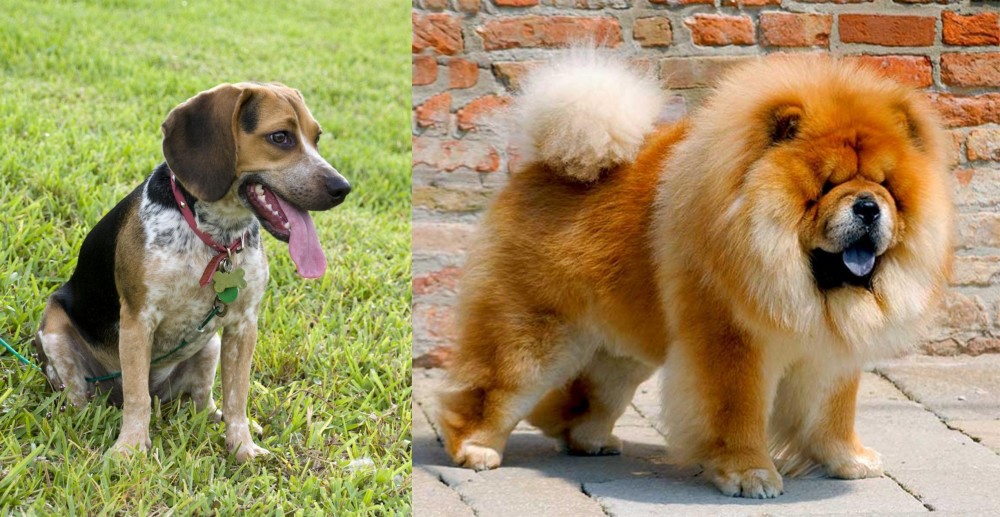 Bluetick Beagle is originated from United Kingdom but Chow Chow is originated from China. Bluetick Beagle may grow 10 cm / 3 inches shorter than Chow Chow. Bluetick Beagle may weigh 20 kg / 44 pounds lesser than Chow Chow. Both Bluetick Beagle and Chow Chow has almost same life span. Both Bluetick Beagle and Chow Chow has almost same litter size. Bluetick Beagle requires Low Maintenance. But Chow Chow requires High Maintenance
Bluetick Beagle is originated from United Kingdom but Chow Chow is originated from China. Bluetick Beagle may grow 10 cm / 3 inches shorter than Chow Chow. Bluetick Beagle may weigh 20 kg / 44 pounds lesser than Chow Chow. Both Bluetick Beagle and Chow Chow has almost same life span. Both Bluetick Beagle and Chow Chow has almost same litter size. Bluetick Beagle requires Low Maintenance. But Chow Chow requires High Maintenance
 Among the hound group of dogs, there are some ancient breeds. The history of the Beagle and the Bluetick Beagle more specifically is fairly uncertain as breeds as we know them today didn't really develop until the 19th century. It was in the mid-1800s the Reverend Phillip Honeywood established Beagles in Essex, England and American breeders started importing Beagles from England to improve the looks of their own dogs. The breed was developed from a number of breeds and possibly the Bluetick Coonhound had some input into the markings of the Bluetick Beagle.
Among the hound group of dogs, there are some ancient breeds. The history of the Beagle and the Bluetick Beagle more specifically is fairly uncertain as breeds as we know them today didn't really develop until the 19th century. It was in the mid-1800s the Reverend Phillip Honeywood established Beagles in Essex, England and American breeders started importing Beagles from England to improve the looks of their own dogs. The breed was developed from a number of breeds and possibly the Bluetick Coonhound had some input into the markings of the Bluetick Beagle.
Today the American Kennel Club recognizes many colors and color combinations in Beagles. with white, tan and black being the more common color. Beagles can also sport ‘markings’ such as blue and red freckles or ticks. If there are black ticks, it can be referred to as blue-ticked.
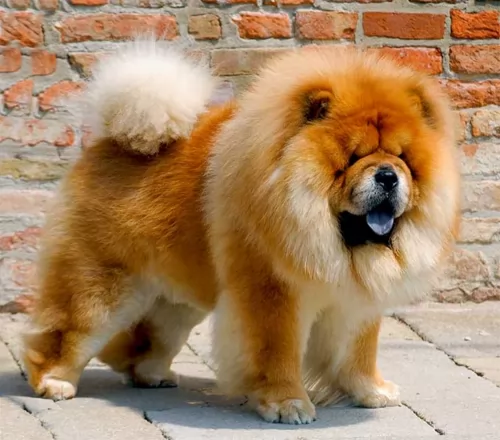 Northern China is the original home of the Chow Chow. In that region of China, the breed was known as the Songshi Quan – “the puffy-lion” dog. They have also been known in China as the “Dog of the Tang Empire” or the Tang Quan. The Chow is believed to be an ancient breed that the Foo Dog, or stone dog guardians of Buddhist palaces and temples, is modeled after. It is one of the most ancient of dog breeds that are still around today.
Northern China is the original home of the Chow Chow. In that region of China, the breed was known as the Songshi Quan – “the puffy-lion” dog. They have also been known in China as the “Dog of the Tang Empire” or the Tang Quan. The Chow is believed to be an ancient breed that the Foo Dog, or stone dog guardians of Buddhist palaces and temples, is modeled after. It is one of the most ancient of dog breeds that are still around today.
It is believed that they have existed for around 2000 years or perhaps even as far back as 3000 years, starting out in Mongolia and migrating to China. The ancientness of the Chow Chow has been validated through DNA testing. In China all those centuries ago, the Chow Chow was born to be a working dog. They hunted, herded, guarded and pulled carts. They went on quests with the Mongolian armies when China was invaded, as well as when the Mongolians invaded the Middle East and Europe later on.
Today’s Canadian Kennel Club has about 350 Chows registered while the AKC gets 10,000 new registrations every year.
 The Bluetick Beagle is a small sized hunting dog. As part of the Hound group of dogs, he has an excellent sense of smell. He has always been used as a hunting dog, and it is why this particular dog is a popular choice for law enforcement agencies – it’s that keen sense of smell.
The Bluetick Beagle is a small sized hunting dog. As part of the Hound group of dogs, he has an excellent sense of smell. He has always been used as a hunting dog, and it is why this particular dog is a popular choice for law enforcement agencies – it’s that keen sense of smell.
He is lean and compact with muscular legs, a broad head, fairly long floppy ears and a broad chest. His coat is short-haired and smooth and its the short blue coloration in his coat sets the Bluetick Beagle apart from the regular Beagle.
The Blue Tick Beagle can have a bit of a stubborn streak, but be that as it may, he still responds well to training and socialization. Alert, he has an amicable nature, and this is what makes this breed such a great family pet He’ll get on well with children in the house as well as with other pets.
The Blue Tick Beagle isn’t an aggressive dog breed. He is lively and playful and full of energy and will require you taking him on walks, runs in the park and lots of games at home.
He loves the companionship of his human family and can’t just be left in the back yard on his own for long periods of time. He can suffer with separation anxiety and also become bored and then he starts with long, mournful howls.
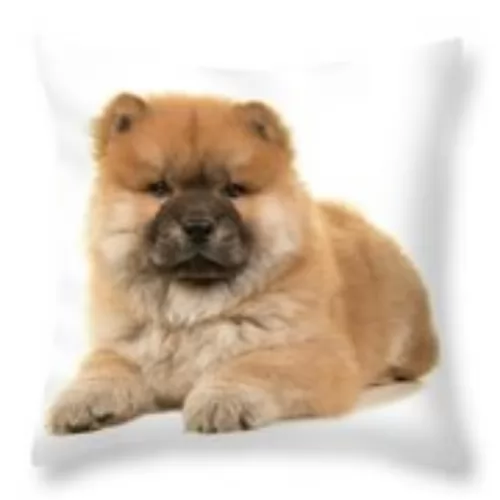 The Chow really does look like a small lion with a black tongue. The dog is sturdy and square with erect, small ears on a broad skull. They have a very dense double coat. Their eyes are deep set and look like almonds, while they all have that very distinctive purple or black tongue. Their lips are also distinctive with their blue color. The nose is black, but some Chows might have a blue nose. The tail is curly.
The Chow really does look like a small lion with a black tongue. The dog is sturdy and square with erect, small ears on a broad skull. They have a very dense double coat. Their eyes are deep set and look like almonds, while they all have that very distinctive purple or black tongue. Their lips are also distinctive with their blue color. The nose is black, but some Chows might have a blue nose. The tail is curly.
These are medium size dogs when it comes to height and weight, but they are powerfully built for their size. Their power is in their compact body holding the energy and strength of a much larger dog. Its hind legs are almost entirely straight, unusual for any dog. They get their lion appearance from the huge ruff that stands behind their heads. Their chest is broad and deep.
 Your Blue Tick beagle is an active, cheerful dog and he makes a good companion for adult or child. He is fairly adaptable and can happily fit into a home in the city- or country. A Blue Tick Beagle doesn’t want to be left alone day after day, so think about your work commitments before you buy buy your Blue Tick and leave him alone.
Your Blue Tick beagle is an active, cheerful dog and he makes a good companion for adult or child. He is fairly adaptable and can happily fit into a home in the city- or country. A Blue Tick Beagle doesn’t want to be left alone day after day, so think about your work commitments before you buy buy your Blue Tick and leave him alone.
Being a hound, although he is gentle and amicable, he can also be stubborn which means he will require some patient training. Because he is a scenthound, he is inclined to catch an aroma and want to go after it, so you’ll need a well fenced garden to keep him in.
Other than that when he is with you, he makes a dedicated and loving companion.
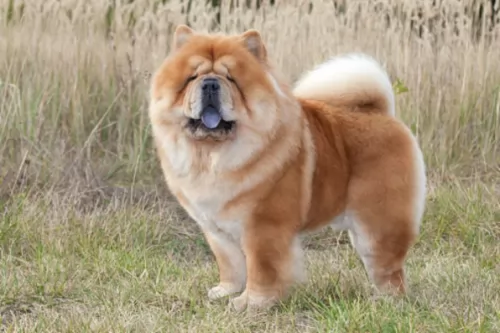 Loyal and true to their family and those they know; the Chow Chow is a little standoffish with strangers. They are very protective and usually attach themselves to one or two people. They are intelligent but stubborn, which can affect your training with them. They need to respect their people and Chows respect hose who take care of them. They can be aggressive toward dogs of their same sex especially if those dogs are the same breed as well.
Loyal and true to their family and those they know; the Chow Chow is a little standoffish with strangers. They are very protective and usually attach themselves to one or two people. They are intelligent but stubborn, which can affect your training with them. They need to respect their people and Chows respect hose who take care of them. They can be aggressive toward dogs of their same sex especially if those dogs are the same breed as well.
They are known to be very clean and many have compared them to cats in that regard. They appear to be dignified and refined. They are usually very quiet but very adaptable dogs.
 Beagles are healthy dog breeds, and with good care, can enjoy an average lifespan of between 12-15 years. Like many other dogs, the Blue Tick beagle is more prone to a number of medical conditions, and more so as it ages. It is essentially a hardy breed that won’t require any particular special care, but common dog problems such as hip dysplasia and skin allergies will need to be watched.
Beagles are healthy dog breeds, and with good care, can enjoy an average lifespan of between 12-15 years. Like many other dogs, the Blue Tick beagle is more prone to a number of medical conditions, and more so as it ages. It is essentially a hardy breed that won’t require any particular special care, but common dog problems such as hip dysplasia and skin allergies will need to be watched.
There are always some health concerns with every dog breed that every dog owner needs to be aware of. Dog with floppy ears such as what the Blue Tick Beagle has will always be prone to ear infections. The ears will need to be kept clean but you can’t just go prodding around in a dog’s ear as you could damage the ears. A visit to the veterinarian will clear up any ear problems.
This particular condition - prolapse of the gland of the nictitating membrane – is important to clear up quickly as it could lead to more serious problems. The longer the third eyelid gland is problematic, the more irritated and inflamed it becomes.
 Although an ancient breed that obviously has survived many centuries of trials, the Cho Chow of today is prone to several different health conditions. These include:
Although an ancient breed that obviously has survived many centuries of trials, the Cho Chow of today is prone to several different health conditions. These include:
This condition can require surgery to keep the turning eyelid from injuring the eye ball.
This can cause lameness and arthritis.
This can cause lameness and arthritis.
Make sure you keep the ears clean and keep an eye on them.
 A good, nutritious diet will help your Blue Tick Beagle steer clear of ill health. He is an energetic breed so will require either home prepared food or commercially manufactured dog food with the right mix of vitamins and minerals to keep his energy levels up.
A good, nutritious diet will help your Blue Tick Beagle steer clear of ill health. He is an energetic breed so will require either home prepared food or commercially manufactured dog food with the right mix of vitamins and minerals to keep his energy levels up.
As mentioned, your BlueTick can be prone to hip dysplasia and skin allergies so a supplement which includes omega 3 is an excellent choice for your dog’s overall health. Make sure to include some raw meat into your dog’s diet and always ensure a constant supply of fresh water.
Your Bluetick Beagle isn’t a huge shedder with his short-haired coat, but he will need to be brushed at least twice a week to keep his coat in tip-top condition and to remove all those loose hairs. Bathing a dog is never encouraged as it removes the dogs natural oils, but of course there are always exceptions when a dog will require a bath.
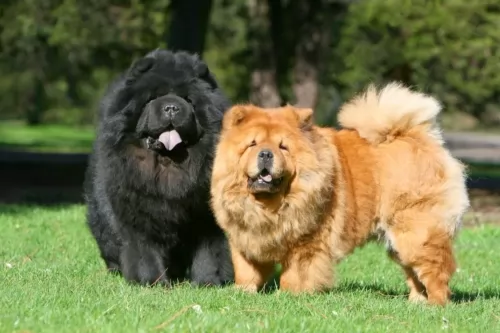 Don’t overfeed a Chow Chow as they are hard workers and big eaters. Feed them at least twice a day.
Don’t overfeed a Chow Chow as they are hard workers and big eaters. Feed them at least twice a day.
This eye disease can lead to blindness if not checked and treated.
These can be removed from an adolescent puppy.
Again, the Chow is susceptible to cancer.
Can lead to heart or kidney problems if left untreated.
Keep a close eye on your Chow Chow skin.
The Chow Chow was developed as working dog, but today’s version is more laid back and doesn’t need excessive exercise. Daily walks will suffice. They live very happily in the city if walked regularly. They are not really a competitive breed outside of obedience and confirmation. They are seldom seen in sports like agility or frisbee.